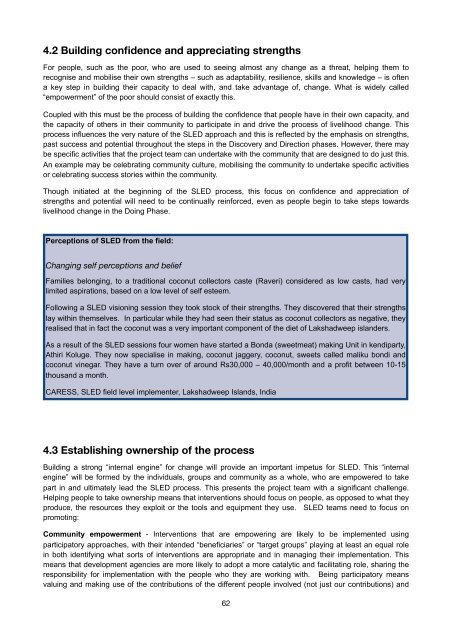Sustainable Livelihoods Enhancement and Diversification (SLED)
Sustainable Livelihoods Enhancement and Diversification (SLED)
Sustainable Livelihoods Enhancement and Diversification (SLED)
Create successful ePaper yourself
Turn your PDF publications into a flip-book with our unique Google optimized e-Paper software.
4.2 Building confidence <strong>and</strong> appreciating strengths<br />
For people, such as the poor, who are used to seeing almost any change as a threat, helping them to<br />
recognise <strong>and</strong> mobilise their own strengths – such as adaptability, resilience, skills <strong>and</strong> knowledge – is often<br />
a key step in building their capacity to deal with, <strong>and</strong> take advantage of, change. What is widely called<br />
“empowerment” of the poor should consist of exactly this.<br />
Coupled with this must be the process of building the confidence that people have in their own capacity, <strong>and</strong><br />
the capacity of others in their community to participate in <strong>and</strong> drive the process of livelihood change. This<br />
process influences the very nature of the <strong>SLED</strong> approach <strong>and</strong> this is reflected by the emphasis on strengths,<br />
past success <strong>and</strong> potential throughout the steps in the Discovery <strong>and</strong> Direction phases. However, there may<br />
be specific activities that the project team can undertake with the community that are designed to do just this.<br />
An example may be celebrating community culture, mobilising the community to undertake specific activities<br />
or celebrating success stories within the community.<br />
Though initiated at the beginning of the <strong>SLED</strong> process, this focus on confidence <strong>and</strong> appreciation of<br />
strengths <strong>and</strong> potential will need to be continually reinforced, even as people begin to take steps towards<br />
livelihood change in the Doing Phase.<br />
Perceptions of <strong>SLED</strong> from the field:<br />
Changing self perceptions <strong>and</strong> belief<br />
Families belonging, to a traditional coconut collectors caste (Raveri) considered as low casts, had very<br />
limited aspirations, based on a low level of self esteem.<br />
Following a <strong>SLED</strong> visioning session they took stock of their strengths. They discovered that their strengths<br />
lay within themselves. In particular while they had seen their status as coconut collectors as negative, they<br />
realised that in fact the coconut was a very important component of the diet of Lakshadweep isl<strong>and</strong>ers.<br />
As a result of the <strong>SLED</strong> sessions four women have started a Bonda (sweetmeat) making Unit in kendiparty,<br />
Athiri Koluge. They now specialise in making, coconut jaggery, coconut, sweets called maliku bondi <strong>and</strong><br />
coconut vinegar. They have a turn over of around Rs30,000 – 40,000/month <strong>and</strong> a profit between 10-15<br />
thous<strong>and</strong> a month.<br />
CARESS, <strong>SLED</strong> field level implementer, Lakshadweep Isl<strong>and</strong>s, India<br />
4.3 Establishing ownership of the process<br />
Building a strong “internal engine” for change will provide an important impetus for <strong>SLED</strong>. This “internal<br />
engine” will be formed by the individuals, groups <strong>and</strong> community as a whole, who are empowered to take<br />
part in <strong>and</strong> ultimately lead the <strong>SLED</strong> process. This presents the project team with a significant challenge.<br />
Helping people to take ownership means that interventions should focus on people, as opposed to what they<br />
produce, the resources they exploit or the tools <strong>and</strong> equipment they use. <strong>SLED</strong> teams need to focus on<br />
promoting:<br />
Community empowerment - Interventions that are empowering are likely to be implemented using<br />
participatory approaches, with their intended “beneficiaries” or “target groups” playing at least an equal role<br />
in both identifying what sorts of interventions are appropriate <strong>and</strong> in managing their implementation. This<br />
means that development agencies are more likely to adopt a more catalytic <strong>and</strong> facilitating role, sharing the<br />
responsibility for implementation with the people who they are working with. Being participatory means<br />
valuing <strong>and</strong> making use of the contributions of the different people involved (not just our contributions) <strong>and</strong><br />
62
















